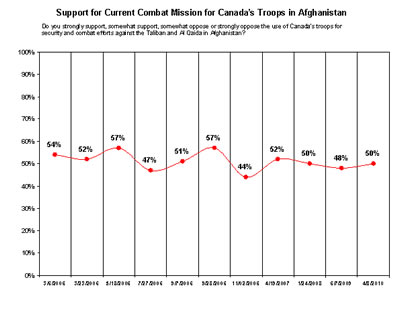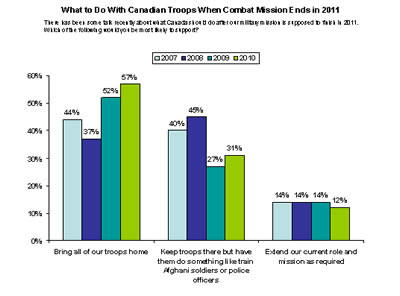Despite New End Date to Afghan War,
Most (77%) Canadians Say Canada Should Still
End Its Combat Mission in 2011
Toronto, ON - During a recent meeting between Afghan President Hamid Karzai and foreign ministers from around a world, a new unofficial end date for the Afghan War was set for three years down the road, meaning that the Afghan government will not assume all of the security responsibilities for the country until 2014. While some countries will begin pulling their troops from Afghanistan as early as this year and others will stay for the duration, Canada's current combat mission is set to end in 2011.
Despite these new developments effectively extending foreign participation in the Afghan War into 2014, a new Ipsos Reid poll conducted on behalf of Canada.com has revealed that most (77%) Canadians believe that `Canada should still end its combat mission in 2011'. Conversely, perhaps believing the argument that ending Canada's current role in 2011 might undermine progress in what some are calling a "pivotal year" in the war, just one quarter (23%) of Canadians believe that `because of these new developments, Canada should extend its combat mission through to 2014'.
Canadians' desire for what should happen after the mission is becoming clearer as the mission approaches its final year. Nearly six in ten (57%) Canadians overall - including a majority in every province - say that when the combat mission ends they'd most support Canada `bringing all of our troops home' (up 5 points since last year and 20 points from 2008). On the opposite side of the spectrum, one in ten (12%) believe the combat mission in Afghanistan should be extended as required (down 2 points since last year). Staking out a compromise, one in three (31%) Canadians believe that we should `keep troops there but have them do something like train Afghani soldiers or police officers' (up 4 points).
Since the start of Canada's mission, support for the use of Canada's troops for security and combat efforts against the Taliban and al Qaida in Afghanistan has remained remarkably consistent, through successes, drawbacks, casualties and scandals. Fully one half (50%) of Canadians currently `supports' (20% strongly/30% somewhat) the mission, while the other half (50%) `opposes' (26% strongly/24% somewhat) the mission. By comparison, in early 2006 Ipsos Reid reported that 54% supported the mission.
What is also clear is most Canadians' unwavering support of the troops: eight in ten (81%) `agree' (7 or higher on a scale of 1-10) that they are `proud of the men and women who serve in our armed forces', down just 1 point since last year and relatively unchanged in the aftermath of recent news reports regarding high-ranking Canadian Forces officials.
These are some of the findings of an Ipsos Reid poll conducted between July 30 and August 4, 2010, on behalf of Canada.com. For this survey, a sample of 1,608 adults from Ipsos' Canadian online panel was interviewed online. Weighting was then employed to balance demographics and ensure that the sample's composition reflects that of the adult population according to Census data and to provide results intended to approximate the sample universe. A survey with an unweighted probability sample of this size and a 100% response rate would have an estimated margin of error of +/-2.5 percentage points, 19 times out of 20, of what the results would have been had the entire population of adults in Canada been polled. All sample surveys and polls may be subject to other sources of error, including, but not limited to coverage error, and measurement error.
Support for the Current Mission...
While support for the combat mission in Afghanistan has swayed very little over the duration of the mission, some groups of Canadians are more likely than others to support the current combat mission:
- Residents of Saskatchewan and Manitoba (67%) are most likely to support the use of Canada's troops for security and combat efforts against the Taliban and al Qaida in Afghanistan, followed by those living in British Columbia (62%), Atlantic Canada (61%), Alberta (55%) and Ontario (51%). Just one in three (33%) Quebecers supports Canada's current role in Afghanistan.
- Men (58%) are much more likely than women (44%) to support the current mission.
- Those aged 55 and older (55%) are more likely to support the current mission than those aged 35 to 54 (48%) and 18 to 34 (47%).
Extending the Combat Mission Past 2011...
While most (77%) Canadians say that, despite the new developments which effectively extend international involvement in Afghanistan to 2014, Canada should still end its combat mission in 2011, some are more likely than others to think so:
- Quebecers (82%) are most emphatic about ending the mission despite these new developments, followed by those living in Alberta (80%), Atlantic Canada (78%), British Columbia (76%), Ontario (73%) and Saskatchewan and Manitoba (73%).
- Women (82%) are significantly more likely than men (71%) to say that, despite these developments, Canada's combat mission should still end in 2011.
Bring the Troops Home...
There appears to be a growing sentiment in Canada that we should bring the troops home once the current mission ends in 2011. Overall, 57% of Canadians say this is the course of action that they would most support - a majority of Canadians in every province - compared to 31% of Canadians who say the troops should stay but be redirected to training efforts, and 12% who believe the current combat role and mission should be extended as required. Leading the charge for troops to come home include:
- Two in three (64%) Quebecers believe the troops should be brought home in 2011, followed by a majority of those living in Alberta (60%), Saskatchewan and Manitoba (58%), Atlantic Canada (55%), Ontario (54%) and British Columbia (51%).
- While seven in ten (68%) women believe the troops should be brought home in 2011, only a minority of men (45%) believe the same.
- Middle-aged (62%) and younger (60%) adults are more likely than those aged 55 and older (49%) to believe the troops should be brought home when the current mission ends in 2011.


For more information on this news release, please contact:
John Wright
Senior Vice President
Ipsos Reid Public Affairs
(416) 324-2002
[email protected]
About Ipsos Reid
Ipsos Reid is Canada's market intelligence leader, the country's leading provider of public opinion research, and research partner for loyalty and forecasting and modelling insights. With operations in eight cities, Ipsos Reid employs more than 600 research professionals and support staff in Canada. The company has the biggest network of telephone call centres in the country, as well as the largest pre-recruited household and online panels. Ipsos Reid's marketing research and public affairs practices offer the premier suite of research vehicles in Canada, all of which provide clients with actionable and relevant information. Staffed with seasoned research consultants with extensive industry-specific backgrounds, Ipsos Reid offers syndicated information or custom solutions across key sectors of the Canadian economy, including consumer packaged goods, financial services, automotive, retail, and technology & telecommunications. Ipsos Reid is an Ipsos company, a leading global survey-based market research group.
To learn more, please visit www.ipsos.ca .
About Ipsos
Ipsos is a leading global survey-based market research company, owned and managed by research professionals. Ipsos helps interpret, simulate, and anticipate the needs and responses of consumers, customers, and citizens around the world.
Member companies assess market potential and interpret market trends. They develop and build brands. They help clients build long-term relationships with their customers. They test advertising and study audience responses to various media. They measure public opinion around the globe. Ipsos member companies offer expertise in advertising, customer loyalty, marketing, media, and public affairs research, as well as forecasting, modeling, and consulting. Ipsos has a full line of custom, syndicated, omnibus, panel, and online research products and services, guided by industry experts and bolstered by advanced analytics and methodologies. The company was founded in 1975 and has been publicly traded since 1999. In 2009, Ipsos generated global revenues of e943.7 million ($1.33 billion U.S.). .
Visit www.ipsos-na.com to learn more about Ipsos offerings and capabilities.
Ipsos, listed on the Eurolist of Euronext - Comp B, is part of SBF 120 and the Mid-100 Index, adheres to the Next Prime segment and is eligible to the Deferred Settlement System. Isin FR0000073298, Reuters ISOS.PA, Bloomberg IPS:FP



